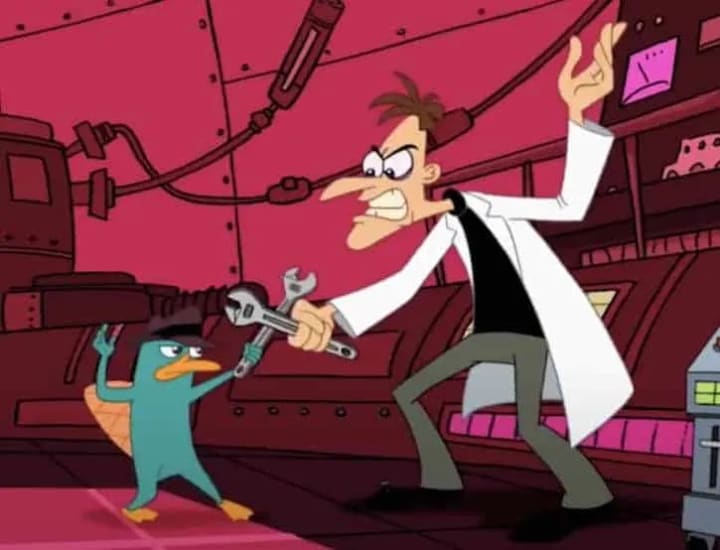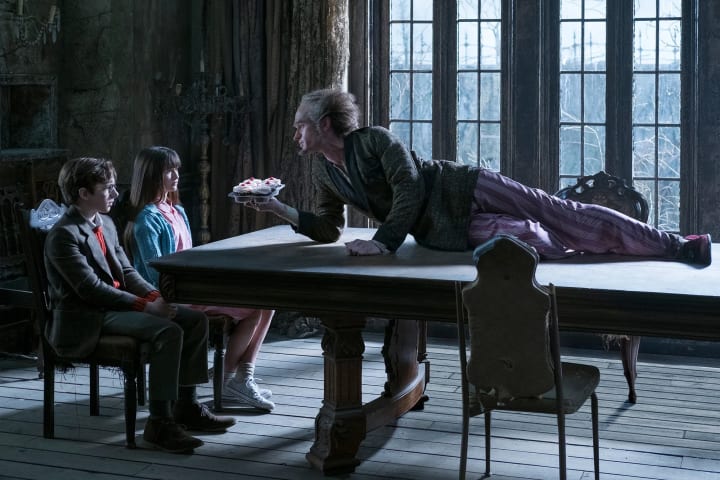
Although I love all forms of comedy, there is something about dry humor I find absolutely delicious.
From the deadpan delivery of Ron Swanson to the played-straight craziness of any Wes Anderson movie, nothing makes me laugh more than a crispy, crackly, dehydrated joke. Though I love a good stand-up comedy sketch as much as the next pun-o-phile, it's always the dry stuff that catches me completely off guard and thoroughly subverts my expectations.
Lemony Snicket (pseudonym for Daniel Handler) is an author who has perfected this brand of humor. I still remember reading his Series of Unfortunate Events for the first time as a junior in high school and nearly doing a spit-take on every page. His books, although technically "kids books," were delightful even for an angsty young adult to read. They're simultaneously dark, optimistic, witty, and oh-so-very dry that even now I can still have good belly laugh from Snicket's writing. It's just that good.
However, as an aspiring writer, my job is not only to enjoy what I read but to understand it. And as someone who adores dry humor, it was almost an obligation that I study Snicket and learn how he creates such clever, witty, yet unmistakably desiccated prose. Below, I've listed three elements in his writing that have helped me craft better dry humor.
1. Be Creatively Incorrect
“There’s an easy method for finding someone when you hear them scream. First get a clean sheet of paper and a sharp pencil. Then sketch out nine rows of fourteen squares each. Then throw the piece of paper away and find whoever is screaming so you can help them. It is no time to fiddle with paper.”
Lemony Snicket from "Who Could That Be at This Hour?"
There are about a million ways to perform a task incorrectly. Yet, being the unimaginative creatures that we are, we only mention about two of them when we give instructions. We say things like:
"Don't turn the wrench counter-clockwise, or else you'll tighten the bolt!"
Instead of:
"Don't use a baguette to loosen the bolt. The crumbs make a bigger mess than a wrench."
Of course, in modern human life it is much more efficient to tell a person something they might not know instead of something they definitely know. However, when it comes to writing humor, giving obvious but extremely creative advice can be insanely hilarious. Part of what makes Dr. Doofenshmirtz from Phineas and Ferb so funny is this exact concept. All of his schemes usually come from a very simple problem with a very simple solution, but the humor comes in when he chooses the most imaginiatve, complicated, and elaborate way to solve this simple problem.

How to Practice:
Think about different mundane tasks that every human knows how to do. Things like making a sandwich, mowing a lawn, or ordering something at a restaurant. Then, try to write an instruction for these tasks that advises against something very obvious and very ludicrous. For instance, what you might write for ordering at a restuarant could be:
"When ordering at McDonalds, it's typically unhelpful to communicate via demonic screeching as most fast food employees have yet to learn that language."
The crazier the better. Let your imagination run wild!
2. Use Jarring Juxtaposition
“Tears are curious things, for like earthquakes or puppet shows, they can occur at any time, without any warning and without any good reason.”
Lemony Snicket, from A Series of Unfortunate Events 3#, The Wide Window
Part of the reason why the above Snicket quote is so funny is because it takes three very unrelated things - tears, earthquakes, and puppet shows - and binds them together with one commonality. The humor comes from the bizzarity of these random things occupying the same thought. This practice is known as juxtaposition, and its most effective use comes by way of comparison, as in "cats are like three-tiered cakes" or "children are like parking tickets."
The key, however, is that Snicket includes a commonality, and that commonality is typically what makes the entire comparison work. For instance see this first half of another Snicket use of juxtaposition:
“People aren’t either wicked or noble. They’re like chef’s salads."
On it's own, it's still a humorous comparison to draw. But compared to the full quote with the commonality between humans and chef salads included, it becomes far more hilarious - and accurate too:
“People aren’t either wicked or noble. They’re like chef’s salads, with good things and bad things chopped and mixed together in a vinaigrette of confusion and conflict.”

How to Practice:
Think of two completely random things that have no apparent commonalities, such as a baseball bat and a chinchilla. Then try to find a way to juxtapose them. It's possible that the two random things won't be comparable at all and if that's the case simply choose something different. Fortunately, I was able to think of one connection between a pet and sports equipment:
"Buying your child a chinchilla is very similar to buying your child a baseball bat. Soon, the novelty wears off and the kid gets bored. You are left with a baseball bat collecting dust and a chinchilla cage collecting feces."
Some things will juxtapose better than others so don't worry if it takes a few tries to get something truly funny! It's an excellent exercise even if it doesn't necessarily produce any publishable humor.
3. Take It Literally
"A library is like an island in the middle of a vast sea of ignorance, particularly if the library is very tall and the surrounding area has been flooded."
Lemony Snicket, from "Horseradish: Bitter Truths You Can't Avoid"
The third and final tool Snicket employs is probably one of his simplest to execute. I say that because most of us as writers have already worked on creating descriptive metaphors and evocative similes in our works. We are also likely to be familiar with clichés - even if it's mostly through the struggle of not using them. All of these things are ripe for a dry, literal interpretation.
What exactly do I mean? Take for instance this Lemony Snicket quote featured in the subtitle that says,
"Anyone who thinks the pen is mightier than the sword has not been stabbed with both."
Since we are able to grasp abstract concepts, we understand that the original phrase, "the pen is mightier than the sword," doesn't mean a writing utensil is just as handy in a fencing match as a rapier. Instead, we understand it means that sometimes ideas can be just as powerful as physical force. However, by taking the phrase literally, Snicket simply compares them both as weapons, something the sword is far mightier at being. And thus, the comedy ensues.
This idea of taking certain phrases literally works for metaphors:
"The sea was clear glass, which was unfortunate since things get pretty sharp once you start swimming."
It works for similes.
"Her smile beamed like the sun, though luckily not at the same temperature."
It works for clichés too!
"Whoever said a bird in the hand is worth two in the bush must have been referring to something smaller than a full-grown ostrich."
When taken to their literal conclusion, so many things can sound absolutely hilarious. It just takes a mind who is on the the look-out to spot the opportunity.
How to Practice:
Find an old piece of writing and locate any similes, metaphors, or clichés that you used in it. See if you can take those literary devices and turn them into dry humor jokes by taking each one as literally as possible!
In Conclusion:
Lemony Snicket (Daniel Handler) is a brilliant, honest-to-goodness master of creating dry and brilliantly clever humor. Obviously, a short analysis like this one doesn't encapsulate the entire breadth of is knowledge and mastery so I encourage any reader who is interested to do some research of their own! Still I hope this was helpful, if cursory, guide to creating your brand of dry comedy. It was certainly educational to me!
Go forth and make your readers laugh!
About the Creator
Emma C
Emma is an aspiring creative who deeply loves art of all kinds. She is a hopeless movie geek and book nerd who spends her free time buried in novels and practicing her violin. She hopes to use her writing to inspire her fellow humans.






Comments
There are no comments for this story
Be the first to respond and start the conversation.